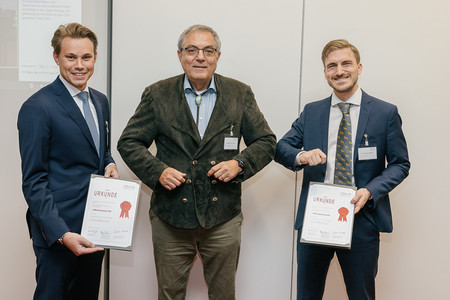In their study, the finance researchers focus on the connection between corporate sustainability in the form of corporate social responsibility activities and the risks of financial companies.
We spoke with Florian Neitzert about the award-winning article and his research.
Dear Mr. Neitzert
First of all, congratulations on the award of your article.
In the FIRM Yearbook renowned scientists and high-ranking practitioners regularly publish articles on current issues of risk management and regulation of financial institutions. What does winning the FIRM Yearbook Award mean for you personally and professionally?
FN: Thank you – Matthias Petras and I were really pleased about the award. The FIRM Yearbook Award 2020 is a confirmation that our study also provides added value for the banking practice. Especially for young researchers, it is quite difficult to assess their research, thus, such an award also gives us motivation for further research.
In your research, you will examine in particular the effect of corporate social responsibility activities at financial institutions and in doing so you will highlight the causal relationship to idiosyncratic banking risk. For the non-business people among us, what exactly does this mean?
FN: Idiosyncratic bank risk is first of all the risk a bank is exposed due its individual characteristics. Corporate social responsibility activities are operationalized based on so-called ESG-factors. These non-financial performance indicators measure a bank's environmental, social, and governance performance. Our study shows that corporate social responsibility activities reduce the default and portfolio risk of banks. In a further breakdown of this effect, we trace the risk-reduction back to particularly environmental factors.
Banks have been under critical observation, not least since the financial and sovereign debt crisis. Back then, the government had to stabilize the financial system with taxpayers' money.
What has happened since then in terms of confidence-building and sustainability aspects in the financial sector?
FN: The financial crisis in 2007 has certainly led to a rethinking in the banking industry. This is one of the reasons why sustainability aspects are now of immense importance in many banks. Of course, the emphasis on sustainable business activities can restore confidence if it becomes credible that banks are conducting them out of their conviction and not for image-building ("greenwashing"). Moreover, in the Covid crisis, a lot of banks deferred the repayment of their customers` loans temporarily. Such actions indicate that banks` are interested in long term business relationships.
The new claim of the WiSo faculty of the University of Cologne is "Today`s ideas - tomorrow`s impact". Based on the results ("ideas") of their research, what actions and resulting changes ("impact") do they advise companies to take?
FN: Although corporate social responsibility is supposedly essential for every large company nowadays, companies only benefit from such activities if they actually impact the company`s culture and are not just for show. Nevertheless, companies of the real economy and the financial sector should continue to develop their sustainability practices on a broad basis. Last but not least, an adequate promotion of corporate social responsibility activities by supervisory authorities and rule-setters can make a valuable contribution in the future.
I thank you for the interview and wish you all the best for your research.
The questions were asked by Andrea Leon Diaz
